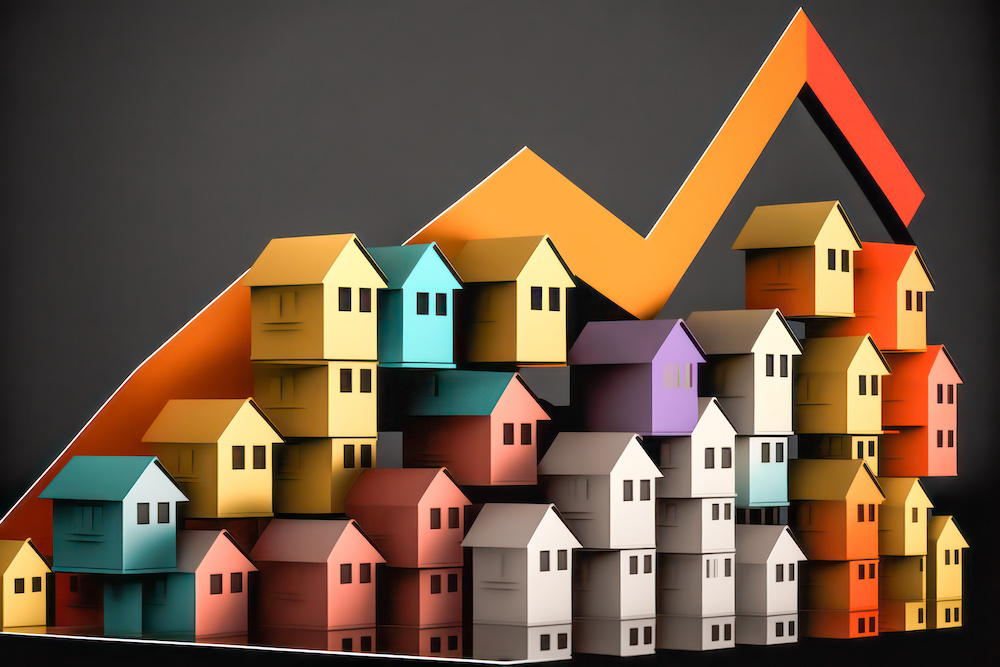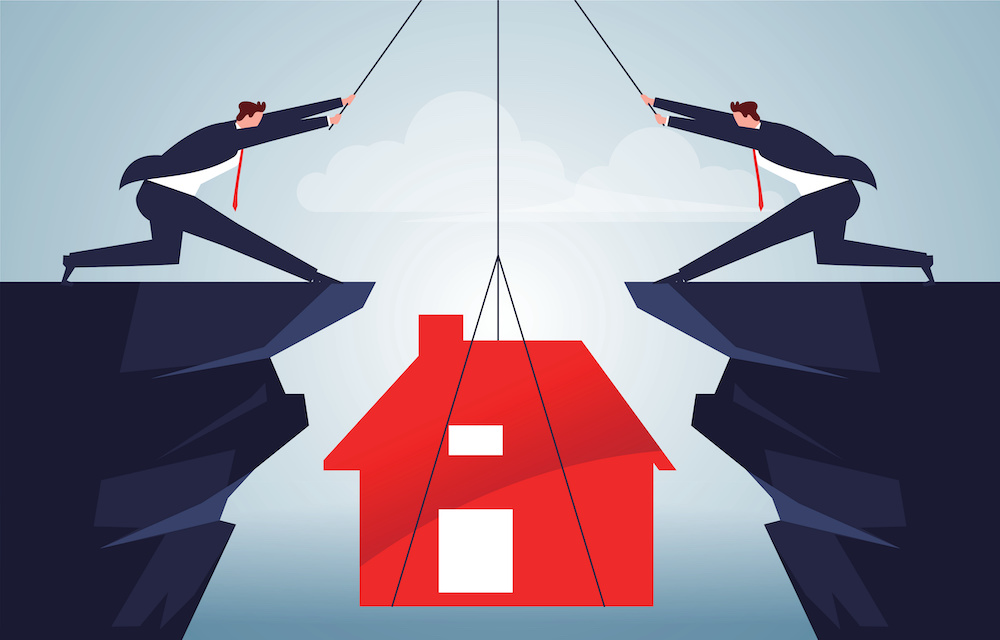You’ve probably heard the term housing bubble thrown around in conversations about the real estate market, especially in the context of sharp price increases and potential downturns. But do you truly understand what it means? More importantly, do you know how it can impact you as an investor, homeowner, or prospective buyer? This guide is designed to help you grasp the essentials of a housing bubble, breaking it down in clear, straightforward terms.
What is a Real Estate Bubble?
At its core, a housing bubble occurs when there’s a rapid increase in house prices, often driven more by speculation and demand than by underlying fundamentals. It’s like a balloon filling up—prices inflate quickly and can often burst just as fast. Now, while this analogy might seem oversimplified, it captures the essence of what is a housing bubble: a market condition where property values are significantly higher than their intrinsic worth.
Characteristics of a Housing Bubble
There are key telltale signs of such a bubble:
-
Rapid and unsustainable increase in housing prices: This is often the most visible symptom, where property prices rise at a pace that far outstrips historical norms or economic fundamentals.
-
High levels of mortgage debt relative to income: As speculation rises, so does borrowing, with many hoping to capitalize on the rising tide.
-
Speculative buying and selling patterns: Think of buyers purchasing properties with the primary aim of selling quickly for a profit, rather than for long-term occupancy or rental income.
-
An inventory buildup as sales begin to slow down: As prices peak, demand wanes, leaving a surplus of properties on the market.
[ Thinking about investing in real estate? Register to attend a FREE online real estate class and learn how to get started investing in real estate. ]

Causes of a Housing Bubble
Economic Factors
Low-interest rates are often a catalyst. When borrowing is cheap, more people vie for properties, driving prices up. Additionally, expanded mortgage lending, sometimes even to those with a dubious credit history, can inflate the bubble further. This type of subprime mortgage lending is what we saw during the real estate market bubble of 2006-07.
Psychological Factors
The human psyche plays a part too. Overconfidence and a speculative frenzy often set in, bolstered by the belief that prices will always rise. Remember, it’s this euphoria that makes many ignore the looming signs of what is a housing bubble.
External Triggers
Global economic events or even shifts in government policies can be the proverbial straw that breaks the camel’s back. As sources like “The Balance” highlight, international financial crises or abrupt regulatory changes can speed up or exacerbate a housing bubble’s formation.
The Lifecycle of a Bubble in Real Estate
Understanding the progression of a housing bubble provides clarity on its emergence, growth, and eventual decline. Let’s delve deeper into each phase:
Phase 1: Boom
This initial phase heralds the start of increasing property values. Several factors can initiate this boom:
-
Economic Growth: As the economy thrives, people have more disposable income. This often leads to more demand for homes.
-
Low-Interest Rates: With lower rates, mortgage loans become more affordable. Consequently, more individuals enter the housing market, driving up demand.
-
Optimism: The belief that the housing market will continue to prosper leads more people to invest in properties, either for personal use or as an investment.
-
Increased Access to Loans: Financial institutions might offer more lenient borrowing terms, leading to higher numbers of approved mortgages.
Phase 2: Overheating
As the name suggests, this phase is marked by an over-acceleration of growth. It’s the transition from healthy growth to potential instability:
-
Rapid Price Increases: Housing prices skyrocket beyond typical market valuations, often at rates that far outstrip wage growth or inflation.
-
Speculation Rises: Buyers start purchasing properties not for the sake of housing but in the hopes of selling them quickly for a profit.
-
Warning Signs: Traditional metrics used to gauge housing value, such as the price-to-rent ratio or the mortgage-to-income ratio, begin to deviate from their historical norms.
Phase 3: Bubble
The bubble phase is where the risks are at their peak, and the instability is pronounced:
-
Unsustainable Price Levels: The prices of properties now far exceed their intrinsic worth. This disconnect is mainly driven by speculation and not by genuine demand or utility.
-
Increased Inventory: As more people try to sell (either to realize profits or out of fear), the market begins to have a surplus of properties, leading to longer selling times.
-
Denial: Despite clear indicators, many remain optimistic, believing that the market will somehow sustain these levels. This denial can be supported by media, industry pundits, or even government reassurances.
Phase 4: Bust
This is the inevitable correction phase:
-
Sharp Price Declines: Property values drop, sometimes dramatically. Those late to the selling game or those who couldn’t sell during the bubble end face plummeting property values.
-
Economic Ripple Effects: As property values fall, local governments might see decreased property tax revenues. The construction industry slows down, leading to job losses.
-
Mortgage Defaults: Homeowners might find themselves in a situation where they owe more on their mortgage than their property’s current value. This negative equity can result in increased mortgage defaults and foreclosures.
-
Banks and Financial Crisis: With increased defaults, banks and other lending institutions face financial strain. If widespread, this can lead to a broader financial crisis, affecting other sectors of the economy.
[ Learning how to invest in real estate doesn’t have to be hard! Our online real estate investing class has everything you need to shorten the learning curve and start investing in real estate in your area. ]

The Impact of Housing Bubbles
On Homeowners
Imagine owing more on your mortgage than your home is worth. This negative equity can lead to foreclosures. Moreover, with a major chunk of their wealth evaporating, homeowners might cut back on spending, affecting their overall financial stability.
On Real Estate Investors
For investors, a housing bubble is a double-edged sword. While there’s potential for immense profit during the boom, the bust can lead to significant losses.
On The Broader Economy
The ripple effects of a housing bubble bursting are vast. Construction jobs can decline, and industries related to housing feel the pinch. Even banking and other financial services may face crises, given their exposure to mortgage debts.
How To Protect Against Real Estate Bubbles
Knowing what is a housing bubble is just one part of the equation. The real challenge is in navigating through these turbulent times. Whether you’re a homebuyer or a real estate investor, taking certain proactive measures can minimize your risk and position you better for the future.
Essential Steps for Homebuyers
For homebuyers, due diligence is more than just a catchphrase; it’s a necessity. Researching thoroughly means delving into property values, neighborhood safety, and potential growth in the area. Be cautious when you see deals that seem too good to be true—they often are. Take the time to inspect the property and hire experts like appraisers and inspectors to give you an unbiased view. Moreover, consult a mortgage advisor to understand how different loan options could impact you in the long term.
Avoid the lure of adjustable-rate mortgages that offer low initial rates but can increase dramatically, particularly if you believe the market is nearing the top of a bubble. Borrowing heavily during a bubble can be akin to financial Russian Roulette. A drop in property values can quickly lead to negative equity, where you owe more on your mortgage than your home is worth. And remember, even in a hot market, traditional rules like the 28/36 rule—which states that you should spend no more than 28% of your gross monthly income on housing costs and no more than 36% on total debt—still apply.
For Real Estate Investors
Education and market research are key. Different markets respond to economic pressures in varied ways; some might be more resilient to housing bubbles than others. Keep an eye out for indicators like rapid price increases or high levels of unsold inventory. And always, always have an exit strategy (or multiple). Knowing when and how you’ll sell can keep you from making hasty decisions driven by market hysteria.
In a market characterized by rapidly increasing prices and speculative investments, long-term fundamentals can often be overshadowed. However, true real estate value is derived from factors like location, demand, and utility. An investment that makes sense from a fundamental point of view provides an added layer of security, even in a bubbling market.
And remember, diversification is your best friend. Don’t put all your eggs in the “real estate” basket; instead, consider other investment avenues like stocks, bonds, or mutual funds to balance your portfolio. Just like any other investment, understanding your risk tolerance and investment horizon can help tailor your real estate investment strategy.
Summary
In essence, understanding what is a housing bubble is a blend of economic knowledge and market vigilance. While the allure of real estate is undeniable, and the benefits can be substantial, it’s essential to navigate the terrain with both eyes open. Stay informed, keep up-to-date with the latest strategies that are working right now, do your due diligence, and always seek expert advice to ensure your decisions are well-founded. Remember, as enticing as the housing market may seem, bubbles remind us to tread carefully.
Ready to start taking advantage of the current opportunities in the real estate market?
Click the banner below to take a 90-minute online training class and get started learning how to invest in today’s real estate market!

